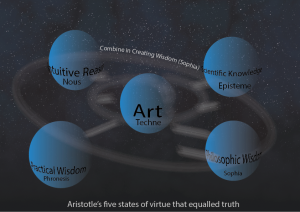Intelligent Leadership
Collective intelligence in applying knowledge and understanding to practice.
What is Intelligent Leadership?
The process of Intelligent Leadership is a means by which we are able to make sense of problems or issues. Intelligence is less to do with personal or emotional intelligence but is more to do with collective intelligence in applying knowledge and understanding to the practice of leading.
We can return to the ancient classics to understand this concept. Aristotle identified five states of virtue that equalled truth:
[otw_shortcode_accordion number=”5″ item_1_title=”Art (Techne)” item_1_content=”In terms of practice Aristotle distinguished between ‘making’ and ‘doing’. ‘Making’, Aristotle argued, is art (expertise in producing some output) whereas ‘doing’ is the ‘end’ (or outcome). This is a rational way of describing this because we can explain how we made something, irrespective of its intended use. For example, a violin is not made for its own sake, but for a musician who will play the instrument and make wonderful music! Successful Techne relies on the remaining virtues. We will start with Intuitive reason (below). ” item_1_opened=”closed” item_2_title=”Intuitive reason (Nous)” item_2_content=”Intuitive reason (otherwise known as intellect/nous) is the capacity we build through our experience, to understand the sources of knowledge and truth, and to consider our important and fundamental assumptions (which may of course be either right or wrong). Unlike knowledge (episteme), it deals with unarticulated truths, but then draws upon episteme for its scientific knowledge (or evidence). Nous therefore provides phronesis with its aims, whereas scientific knowledge (see next) provides the knowledge to generate philosophical wisdom.” item_2_opened=”closed” item_3_title=”Scientific knowledge (Episteme)” item_3_content=”For Aristotle, one has scientific knowledge whenever one has the appropriate sort of confidence and knows the principles, for if one does not know them better than the conclusion, one will have scientific knowledge ony coincidentally. Selective knowledge can e problematic, for we all often assume that what we know is not capable of being otherwise and, as argued by Aristotle (translated by Sachs) that it escapes our notice when they are not; in other words, we will ignore it if it doesnot accord with our so-called knowledge! A further point is that all knowledge seems to be teachable, and what is known is learnable. However, how do we seek to know the unkonw and thus, by implication, we cannot teach what we do not know!” item_3_opened=”closed” item_4_title=”Philosophic wisdom (Sophia)” item_4_content=”Because wisdom belongs to the wise, who are unusual, it cannot be that which gets hold of the truth. This is left to nous (described earlier). Aristotle describes wisdom as a combination of nous and episteme (knowledge with its head on). Therefore, wisdom must clearly be the most advanced representation of knowledge. It follows that the wise man must not only know what follows from the first principles, but must also possess truth about the first principles. Therefore, wisdom must be intuitive reason combined with scientific knowledge–scientific knowledge of the highest objects which, at this time, can be attained. ” item_4_opened=”closed” item_5_title=”Practical wisdom (Phronesis)” item_5_content=”Practical wisdom represents the judgement used in deciding upon the action to be taken, not the specific act or acts of making, which is art (techne). While the aim (or truth) in the art (techne) would concern making something needed for an agreed purpose, phronesis judges things according to the wider purpose (or outcome). It is an important virtue that, unlike techne or episteme, will require further discussion. Aristotle associates this virtue with the political art and distinguishes skilled deliberation from knowledge, because we do not need to deliberate about things we already know. It is also distinct from guessing, or learning; it must always be a type of inquiry and reasoning. ” item_5_opened=”closed”][/otw_shortcode_accordion]
From Aristotle to Global Leadership
Everything that we do as human beings impacts others and our planet; equally, everything that we do within our home and working lives involves relationships of one form or another. This has implications for leadership and, as history has shown us repeatedly, human beings are flawed!
Ethics play a key role in ensuring that we as human beings can balance our behaviours. Our ancient Greek forefathers looked for the ‘mean’ between two extremities in determining both the character (ethos) and thought (dianoia) of our soul (psyche). The first (character) is driven by desires whereas the latter (thought) is determined by reason.
In arguing for intelligent leadership, what we are really arguing for is an evidence-based approach to leadership. Grounding this in the ancient philosophy (meaning “love of wisdom”) of Aristotle (and Plato and Socrates before him, respectively) has real merit. In that much less complicated world, taking time out to ‘think’ was their occupation and less cluttered by the information-overload of 2,500 years later, it still has much resonance today. Plato’s academy survived for 850 years!
If Nous (Intuitive reason) and ‘Episteme’ (Scientific Knowledge) combine to form the ‘knowledge with its head-on’ (Sophia) – as Aristotle has described it – in support of the ‘Techne’ (the making) then the resultant ‘Sophia’ (Philosophic Wisdom) and ‘Phronesis’ (Practical Wisdom) combine in bridging the gap between theory and practice. This is the gist of intelligent leadership, and is illustrated in the figure below.
An Activity
Consider these five states within the concept of leadership in the twenty first century and make a note of your thoughts:
1. Are they still relevant
2. In what way/s
3. Which do you think is the most important?
References [1] Aristotle, Ross W.D and others (translation) (2009), The Nicomachean Ethtics: Book VI:3(p.104 of 277)
